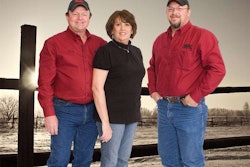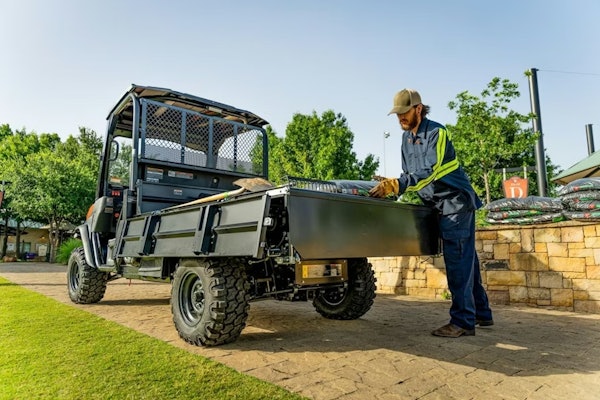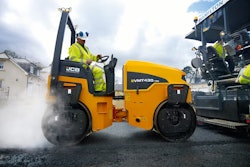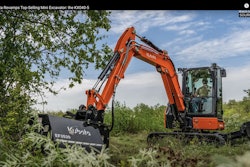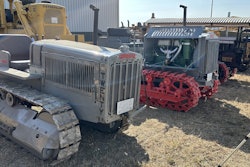Quality and integrity remain the core values for this specialty contractor
Some people are born with good business sense, while others learn from experience. Bradford T. Clubb, president of Flyway Excavating, Lititz, Pennsylvania, acquired both, coming from a background that encouraged an entrepreneurial spirit and finding a mentor in his father. Beginning at an early age, Clubb worked during the summer as a laborer for his father’s now 100-plus year old general construction firm, driving a small dump truck to haul building materials and trash. He gained valuable knowledge on building construction, layout and learned from superintendents how to set up jobs.
But the decision to follow in his father’s footsteps didn’t come easily at first. A self-proclaimed “motor head,” Clubb enrolled in mechanical engineering at the University of Delaware. He thought he’d enjoy a heavy focus on math and science, but after three years he returned home.
His father purchased 100 acres near the local airport, which he developed into Flyway Business Park. After overseeing sewer and water system installation projects performed by other local contractors, Clubb convinced his dad to let him rent equipment and learn to cut in streets and install the storm system with the help of a few other employees. One employee, Jim Kleinhaus, had site work experience and taught Clubb the basics of excavation.
Three years later, in 1987, Clubb started his own company, called Flyway Excavating, which sits on a portion of the land his father bought. When Flyway first began, it had eight employees, relied primarily on a track loader and a backhoe, and accrued an annual volume of a little more than $1 million. Since then, Clubb has propelled his company to its highly respected position in the community through quality site prep and utility projects, as well as niche jobs such as stream restoration and low head dam removal. Flyway now has 20 employees, at least 18 major pieces of equipment and in 2008, an annual volume of $4 million.
Survival of the fittest
At the height of the late 1980s, work was so abundant for Clubb and his crews it was hard to imagine things slowing down. Then 1991 hit and the company’s volume plummeted. “We lost $120,000 and went from getting wined and dined by the bank to having no line of credit,” Clubb says. Just when he and his wife, Jill – who acted as a bookkeeper for Flyway at the time – thought they weren’t going to make it, Brad’s father loaned them some money to keep the company alive.
“I’d compare the current economy to that time, but now we have a much older, more mature business,” Clubb notes. “Last year was more successful for us, however, which is probably the case with most contractors.”
Stream and restoration projects across the state have remained Flyway’s bread-and-butter, because of the lack of competition for such a specialized, niche market. Last year, however, much of their work came from local colleges, including Franklin and Marshall College and Elizabethtown College.
For the $1.5 million Franklin and Marshall College project, Flyway improved campus roadways and did site prep for on-campus housing, installing sewer and stormwater lines and trenching for electrical lines. They also completed some site work for a medical care facility and site restoration work at a local Presbyterian church. The latter required reclaiming old asphalt and then paving a large lot for 300 new parking spaces – all within a week.
Even with the economy taking a drastic turn for the worse, Flyway Excavating isn’t sitting idle. They’ve undergone a major transition from private, negotiated work to mostly public work, since the private market has less to offer.
“Available private jobs may have as many as 12 bidders, where there used to be a select number,” Clubb says. “Everyone’s desperate to keep their big iron moving.”
Clubb and his managers realized they needed a strategic plan to rethink the company’s goals. First, they considered past jobs and found some opportunities they might have missed otherwise. Then they decided to send marketing pieces to different watershed groups and contacts regarding stream restoration work. They wrote all their ideas down on a sheet of paper, and have revisited their plan at every manager’s meeting.
“We’ve started doing road reconstruction for boroughs and townships again, and it has paid off. We were just awarded a $1 million streetscape project,” he says.
To further adjust to projects shifting in size and scope, Clubb is considering trading in one or two of his larger excavators, for compact zero-tail-swing excavators. “If we must change equipment to keep up with the work being done, we will,” he says.
While the gut reaction in times like these may be to cut corners, Flyway doesn’t plan to partake in this philosophy. “We aren’t skimping on quality delivered to our customers. Instead, we’ve taken a more proactive approach by sending out customer surveys after we finish jobs, and we’ve seen good responses so far,” Clubb says.
One other important goal: keeping employees happy. Clubb knows they must continue to pay the bills and he’s actually given raises over the past few months – almost unheard of right now. All of these changes have lead to positive results so far, but Clubb hopes the future will only get better.
Values added
Although much of Clubb’s industry knowledge was ingrained at an early age, he continuously seeks to educate himself on all aspects of business, including undergoing leadership training and mentoring those new to the industry. He does this not only to recruit the best employees, but also to promote construction as a career.
“If I was back at square one, I’d try to develop leadership and people skills early on, because it hasn’t come naturally,” he admits. “I’ve had to work at showing my appreciation and developing ways to delegate so I’m still appraised of the situation.”
Luckily, several employees have stepped up in recent years, such as Ray Long, a project superintendent since 1989, and Jeremy Coble, who grew up on a farm and began working for Flyway right out of high school. Clubb’s eldest son Ross, 20, also works for Flyway in his spare time and during the summer.
To hone his own leadership skills, Clubb has served as an advisor for the past six years and acted as chairperson for the last three on nearby Lancaster County Career and Technology Center’s Heavy Equipment Program Occupational Advisory Committee, selecting students for the center’s heavy-equipment operation training program and providing guidance for the program’s curriculum.
Clubb regularly attends the center’s career nights to scope out potential employees and loans compact machines for the equipment rodeo skills competition. “We’ve hired students from the center before and allowed them to co-op with us during the spring or summer months as laborers,” he says.
The Associated Builders and Contractors’ Keystone Chapter has also played a major role in furthering Clubb’s career. He has served on the chapter’s board for nine years, acting as chair in 2002.
“When I think of Brad, two words come to mind immediately: ethics and integrity,” says Jack Zimmerman, president and chief executive officer, ABC, Keystone Chapter. “Brad’s the quintessential example of both. He’s a straight arrow, honest, forthright and direct. Construction is a demanding business that often requires compromise, but he works within that sphere without moving away from his values.”
Instead of singing his own praises, Clubb attributes the company’s good fortune and steady growth to his employees and the culture they’ve built over the years. “We look for professionalism and technical expertise and we train our people well,” Clubb says. “I can throw a team together quickly because I know who to go to for certain specialties and who can handle the project management side.”
No easy task – but setting his standards high, and making the company’s standards higher than the client’s has allowed Flyway to excel at complicated projects. One such project: The Jay Group’s new building on 17 acres, which required a large basement excavation, utilities and landscaping.
Jeff Packard, an estimator at Richard Poole, a general construction firm in York, Pennsylvania, worked with the Flyway team on the project, and came away impressed with Clubb’s early budgeting, which held up through the entire job.





